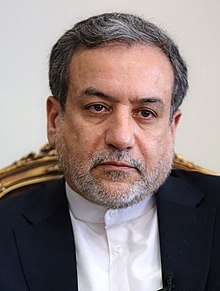Gaza Genocide and Decline of the Western World Order


 S. A Araghchi, Former Deputy Foreign Minister of the I.R of Iran
S. A Araghchi, Former Deputy Foreign Minister of the I.R of Iran
Nematollah Mozaffarpour, Researcher and Writer in Diplomacy & Political Thought
The recent unprecedented developments in the Occupied Territories, the genocide of the people of Gaza, the support of the US and Europe lent to Israel, despite popular opposition and the disgrace of the conciliatory statesmen of the Middle East, has pushed the so-called Abraham Accords to the margins and removed it from the agenda. It can be safely said that one of the reasons that galvanized Hamas and the people of Gaza was this agreement because it brought them complete despair and forced them to tear apart its fabric, in spirit, in semantics and materially, with a strong and surprising blow. Gazans realized that they either have to accept a gradual death or stand up to defend themselves and if they are going to die, die with dignity.
Imam Ali (peace be upon him) says: "Avoid talking to a liar as he is like a mirage. He makes the far in your eyes appear near and the near, far." The Abraham Accords was a mirage that its contrivers presented it as imminent and accessible, but the Al-Aqsa Storm Operation showed that it was nothing more than an artificial image and a simplistic strategy.
From the beginning of the process of the so-called Abraham Accords, Ayatollah Khamenei, the Supreme Leader of the Islamic Revolution, stated that the signatories of the Abraham Accords will not reap its benefits since both Arab and non-Arab nations are against it. Considering the recent unprecedented revolt in the Occupied Territories, these statements prove their high historical, sociological, strategic and diplomatic significance.
All humanistic and even Western schools today consider politics, power, governance, human sciences, peace, reason and rationality as social constructs. The Stanford Encyclopedia entry on social epistemology book goes so far as to consider even information as social, which can be counterintuitive. How can, then, a peace agreement be concluded without a social infrastructure?
Gaza Genocide and the Western Fundamentalism
The positions of the European Union and the United States and their fundamentalist insistence on it show the nadir of moral degeneration and political forgetfulness, which has severely eroded their soft power and contributed to the advancement of the Chinese and other competing narrative across the globe and the Middle East. Gaza proved that the epistemological pluralism claimed by the West and liberal democracies, and basically modernity, has not only not brought peace to the world, but has also been the cause of atrocities. Cruelty of Western civilization is more than any other civilization or empire. To understand the atrocities of the nature of modernity and Westerners, it is enough to read the book "Humanity: A Moral History of the Twentieth Century", written by Jonathan Glover, an English thinker, which is the product of a decade of research by him and his team in the history of the 20th century. Interestingly, Glover also displays a double standard when describing the atrocities of the Marxist or fascist camp, he attributes them to the nature of Marxist or fascism ideology, but in describing the unprecedented massacres of liberal democracies across the world, he refuses to link it to the ideology of liberalism.
Moral decline of the West during the transitional period of the world order
Let's not forget that civilizations and great powers, from ancient Rome and Iran to the Ottomans and Safavids, first experienced moral decline, then political decline, and then geographical collapse and military defeat. No one thought that Ancient Rome would be bifurcated and Western Rome would weaken from within and fail from outside within a century. It was not easy to imagine how the Sassanid Empire was defeated by the Arabs due to moral degeneration.
The United States and Europe are not an exception. The US was formed with the idea that civilization started in Mesopotamia and Persia and then it was transferred to Old Europe and from there, it went to the United States. According to this theory, all civilizations have been replaced by other civilizations, but the American civilization must reach immortality and never die, which requires the globalization of the United States and the Americanization of the world. The fruits of this historical arrogance were theories such as the New World Order and the theory of the End of History whose fate is clear. Three decades ago, the late Edward Saeed mocked Fukuyama's thesis by criticizing his book The End of History and said that instead of narrating the end of history, the book testifies to the end of Fukuyama.
Isn't all this historical experience enough for us to expect a renaissance in American and European foreign policy and at least a more rational policy from the European Union? To fully grasp the ultimate moral decline in the West, it is enough to look at the joint statement signed by Jürgen Habermas, who many consider to be the greatest philosopher alive. A self-proclaimed champion of dialogue in the past four decades and developer of concepts such as Communicative Rationality and the public sphere, taught or parroted in universities around the world, he has practically approved the killing of women and children in Palestine, abusing the principle of right to self-defense and shocking many intellectuals and political thinkers across the world.
The question is: what is the relationship between the killing of Gazans and the Communicative Rationality? Edward Said believes that American and even European intellectuals -whom Saeed interprets as professional/career intellectuals (institutional or serving power)- are strategists who serve at the nexus of power and wealth. The case of Habermas completely attests to Said's claim. In short, the killing of Gazans is a turning point in the spiritual and semantic changes of the world.
Gaza and the post-Western world
The West and especially the Europeans have been exposed to a difficult test that will affect the fate of Western civilization and the Western-oriented world order. These historical milestones are a lesson for the world and will boost the idea that basically other governance patterns can be more stable and peace-making. Words of Iran's Supreme Leader made a few years ago on the emergence of Trump appear the most relevant today: "We thank this gentleman who came [to power]. Thank you for reducing our trouble; you showed the true face of America. What we have been saying for thirty years is the political, economic, moral and social corruption in the American ruling system. This gentleman made this public during and after the election". For the contextualist and culturalist researchers who examine the political and diplomatic phenomena, not just technocratic or essentialist lenses but sociologically, contextually and strategically, this is a very thought-provoking statement. In continuation of Trump's destructive policies, the Gaza genocide exposed the true nature of Western statesmen and their 'human rights' attitude to the world more than before, and their invisible depth that was hidden under a justified appearance and beautiful slogans. A situation that Jacques Derrida calls deconstruction of a hegemonic discourse has happened here. As Ayatollah Khamenei says: "The Western culture and civilization is the same civilization that calls the murder of five thousand children with phosphorus bombs Israel's self-defense. What self-defense is this? In this recent saga, the Western culture was disgraced." These events have their own meaning and will have long-term consequences for Western civilization in the transitional period of international relations. The use of the word "event" is purposeful here because an event is a monumental incident that includes major and minor happenings. Europe will suffer more damages than the US, as they live in the northern borders of the Muslim World, and the ramifications of Gazan genocide will easily affect them from outside and inside.
Nations have the final say in politics, not corrupt elites
Whatever our outlook, we have to admit that nations have the final say in politics and security, and culture and identity are the ultimate guide of nations: French colonialism was expelled by the Algerian nation after two centuries and the laïcité project in Türkiye has practically failed after a hundred years. Any imposed way of life and forced peace is doomed to fail. With this logic, there is no doubt that Palestine will be eventually freed. A very important point is that the current mainstream approach to Palestine can create challenges (protests, revolt) for the emirates and sultanates of the region, especially since the Western countries no longer have the past dominance over these countries. As long as Europe and America do not have a paradigm shift in West Asia and on the issue of Palestine, they will see their position weakened day by day and leave the stage to their competitors.
Genocide in Gaza and revival in Palestine
One can ask why and how the agreement known as Abraham Accords and basically any peace agreement will not be successful and sustainable? Historical sociology and diplomatic experiences give us a clue: these peace plans have no social basis within Palestine and other Muslim nations and will only fuel more violence. Even John Mearsheimer, the realist theorist of international relations, admits that the suppression of Hamas will lead to reinforcement of more radical groups. Interpreting Mearsheimer's words, one can say that fundamentalist power and coercion cannot destroy rooted identities, but rather help them to be reborn and retaliate. Identity, religion and culture: these dynamic and generative elements change from one form to another but do not disappear. If identity is intertwined with land and territory, its power to revitalizate and retribute will double. The French sociologist Bertrand Badie rightly believes that the project of westernization of Islamic lands has always led to retaliatory and revivalist movements and as a result violence and has eroded peace and coexistence.
Abraham Accords, fake image and failed strategy
The above arguments show how sustainable peace in Palestine hinge upon a referendum and the return of all Palestinians to their homeland. Meanwhile, the various Palestinian peace agreements, including the so-called Abraham Accords, lack the following fundamental principles and characteristics and are doomed to failure:
1. Peace as a social issue and collective identity: Peace cannot be engineered or imported. Peace is always the fruit of the development of a social infrastructure and a social phenomenon, and its lynchpin is human rights, centered around human dignity. In the era of globalization and expansion of cross-border ties, peace has become more social. Just as knowledge is deemed as a social construct in the new schools of humanities, peace is also social in the primary sense. A stable and credible peace is one that is compatible with the culture and social structures of the respective country. Since ancient times, intellectuals have acknowledged that laws, including accords of peace, must be in accordance with the identity, natural-social relations and the collective conscience of nations. The Greeks called the laws corresponding to social relations "nomos". Even liberal theorists, including Friedrich Hayek, consider reason and knowledge to be social. Hayek divides reason into two parts: evolutionary reason and constructivist reason, and rejects the second type of reason as destructive and prohibitive. The spirit of the classic book of American traditionalist philosopher MacIntyre, "Whose Justice? Which Rationality?" is that both justice and rationality have different cores and differ from society to society. When reason is social, peace is also a basically social construct. The essence of Montesquieu's Spirit of the Laws is that the laws, including the laws of peace governing nations, should be compatible with their natural social relationships. Relationships that Emile Durkheim calls Collective Consciousness and Ibn Khaldoun 'asabiyyah'. The Abraham Accords is fundamentally unrelated to the infrastructure of Palestinian and West Asian society and is a racist and apartheid project that is neither a pact, nor peace, nor Abrahamic.
2. Peace as human rights: Plato believed that apart from the body, human nature has three appetitive, rational, and spirited, which Westerners call Inner Self and Authentic Inner Self. In his interpretation of Plato and liberals such as Jean-Jacques Rousseau, Fukuyama rightly explains that the first and second dimensions look after economic calculations, utility and instrumental reason, and the third dimension, the original essence, is the state in which humans have dignity (the central concept of the charter of universal human rights). He adds that dignity is a state that responds to people's voices, cries and pains. Therefore, even if we put aside the Quranic outlook and adopt the liberal standards of the concept of dignity, we promptly conclude that one feels dignity when their voice is heard and responded to. That is, from the liberal point of view, hearing the voice and pain of people and the existence of a response mechanism is the most central component of dignity. Now, we have to ask, does the Abraham Accords respond to the voice of the Palestinian nation and other Muslim nations? The answer is too obvious.
3. Peace and philosophy of law: the essence of law is rights, justice, morality, production and protection of civility, creating order and solving problems. Abraham Accords is devoid of all spiritual and material elements of this philosophy.
4. Peace and justice: According to many schools of thought, including Islam, justice and satisfaction, especially community contentment, are the basis of any peace. A stable peace is one in which the nations involved are satisfied with the situation. In this case, peace becomes availabile. That is, the nations and governments of the region resort to a platform that is appropriate and responsive to their hopes and pains, and they consider that platform available. Otherwise, social platforms will resist and the civil society will protest against it. Iranian statesman and thinker of the medieval centuries Nizam al-Mulk Tusi believes that in politics one should stand where one has a place to stand. In the same vein, in designing peace, one should stop at a place where the nations agree to stop there. The Palestinian people will be content to stop at a place where their voices are heard, a voice that rises from their original nature and bolsters their dignity.
5. Peace is a product of dialogue: There has been a lot of political rhetoric about the role of extra-regional powers in disrupting peace in the region. But here, one point can be made and that de-pacification of the region was and is due to the project of engineering, westernization and modernization of the region. That is, westernization has always caused the resistance of the nations of the region and, of course, recourse to violence, due to the inability to protect their beliefs and identity. Part of the radicalism in West Asia has been a reaction to Westernization.
6. Peace and domination of the hegemonic yet abandoned approach in the UN: Concepts such as peace making or peace building that are popular in international organizations and international law are based on rigid colonialist assumptions and principles of the 19th century, which are supported by Western positivist political thought. And it is capitalism who considers peace to be constructed, exogenous and combined with Westernization. We have seen examples of this attitude in Iraq and Afghanistan after 2003 or in the entire Middle East after the First World War. In American logic, peace is a situation in which nations and people are coordinated with Americanism and do not have a dialectical relation with it. As a result, the history comes to a happy end. The same old colonial and fundamentalist superstructure attitude has also entered the discourse of the United Nations system, and one of these raw and immature concepts is 'peacemaking'. Peacemaking was first used in 1992 by UN Secretary General Boutros Boutros-Ghali. He defined the three concepts of preventive diplomacy, peace keeping, peace making in the negative sense and in the sense of eliminating physical violence and ending war, peace building in the positive sense and creating a structure that is designed in a positive way in the way of improving peace and eliminating the obstacles and stabilizing peace. Boutros Boutros-Ghali and his advisors have most likely been influenced by Johan Galtung, the famous peace theorist, in developing these concepts. Galtung was the first to understand the concept of peace using Positive Peace and Negative Peace. Before him, Isaiah Berlin, the English philosopher, had established the concept of Positive Liberty and Negative Liberty for the first time. Apparently, Galtung was inspired by Berlin in establishing those concepts. The United Nations system has had minimum success in developing and guaranteeing peace in the past eight decades, for relying on these concepts, but fundamentalist Westerners do not want to acquiescence that the basis of these processes and paradigm is flawed and needs fundamental reform.
Note: The original text was published in Farsi by IR Diplomacy. The English format is our work.

